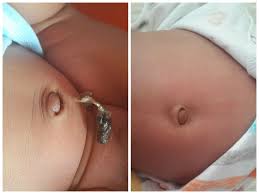Made up of three blood vessels, the umbilical cord connects the placenta to the fetus and maintains blood circulation. The umbilical cord has two smaller arteries that take blood to the placenta. There is a larger vein as well that takes blood back to the fetus. After birth, many people have questions about umbilical cord and start to worry when they notice discharge or bleeding from their baby's belly button. There are certain things to know about what happens after umbilical cord falls off and exactly when you should seek medical help.
When Does Umbilical Cord Fall Off?
The main role of umbilical cord is to supply oxygen and nutrients to your developing baby. It means there is no need for it after birth, and is therefore clamped and snipped, leaving behind a short stump. It is common for parents to ask how long the  umbilical stump takes to dry up and drop off and what happens after umbilical cord fell off. It may take anywhere between 7 and 21 days for the stump to dry up and fall, and when it happens, there will be a small wound that usually heals in a few days.
umbilical stump takes to dry up and drop off and what happens after umbilical cord fell off. It may take anywhere between 7 and 21 days for the stump to dry up and fall, and when it happens, there will be a small wound that usually heals in a few days.
How to Care After Umbilical Cord Falls Off?
It is common to hear so many strategies to take care of the area after umbilicalcord fell off. Many women believe that applying alcohol to the affected area will accelerate healing. There is no scientific evidence that this helps and it may even irritates your baby’s belly button. All you have to do is ensure that you keep the belly button clean and use just water during bath time for cleaning. After which you should dry it up with towel. It is also important to give your baby's wound plenty of air to prevent any infection. You really do not need alcohol, soaps, or other cleaning products.
What's more, it is quite normal to notice your baby's belly button swell a bit and have some discharge. It is called an umbilical granuloma. You should talk to your doctor who will give you a drying medical called silver nitrate to resolve the issue. Be sure to consult with your doctor if you notice smelly pus coming out of the umbilical area.
What Other Moms Say
Soak in bath and clean
"After umbilical cord falls off, you can clean the area and even put your baby in the tub without an issue. Let your baby have a nice long soak because this will help soften the wound in his belly button. This will make cleaning a lot easier. After my second pregnancy, we were a bit worried because the belly button of my son kept bleeding a tiny bit for up to a week and then cord fell out. I now know that it is not that uncommon."
Peroxide on q-tip
"My doctor told me that I can give my baby bath and get him wet after umbilical cord falls off, and I waited for it first. He also advised to clean it with a q-tip with peroxide on it. I tried it and it went perfectly well for my little one."
Cotton wool gentle clean and dry afterwards
"I have two sons. I used to clean their belly buttons after the cord fell off. I used cotton wool for cleaning. It was easy doing it when they were in the bath. I believe you should clean it gently though. Do it daily until it heals completely. You need to use a clean towel to ensure the area is dry. Never use any talcum powder on this area. My sons' belly buttons were quite squishy but everything became normal in a few days."
No alcohol!
"Never use alcohol to clean the belly button of your little one. Trust me; it hurts. It is like pouring alcohol on your open wound. The best thing is to use a q-tip to clean any blood out there. You can also use it to clean the inner side, but do not dig into it deeper. Never ignore any bad smell or discharge because it usually indicates infections."
When to Worry
While it is normal to give your baby a bath after umbilical cord falls off, you need to pay attention to certain warning signs to ensure everything is going smoothly. Here is what you should bear in mind:
- Odor and pus. If you notice the cord has developed a bad odor and there is yellow pus oozing out of it, it may be due to an infection. You may also notice swelling and redness around the area. Seem immediate medical help.
- Redness. Do not ignore redness. It may not be anything serious and may occur because of the dry cord irritating the skin. You can simply push the stump away and use a pen to mark the margin of redness. Check again after an hour or so. If the redness is still there and spreading, it means it is infected.
- Bleeding. It is normal to notice small amounts of bleeding around the stump. You should gently press on the point of bleeding and it should stop. If it continues even after 5-7 minutes of constant pressure, you should talk to your doctor about it.
